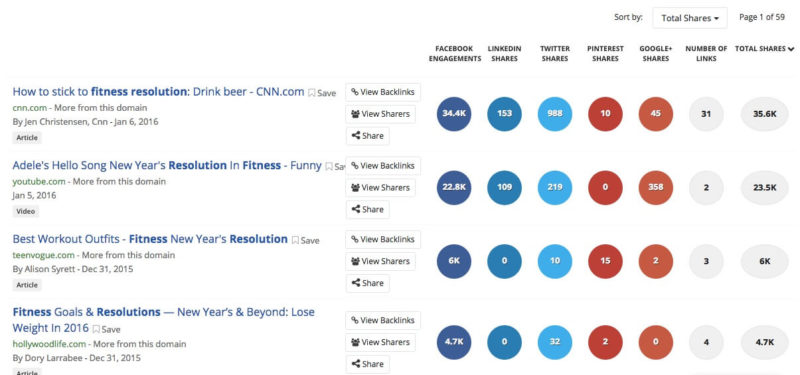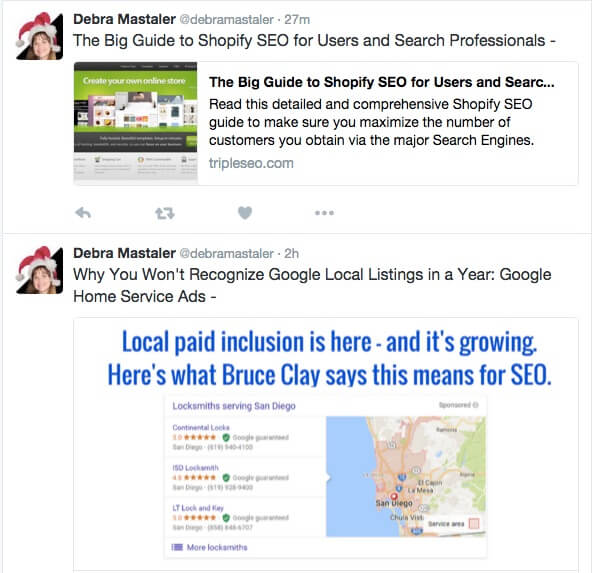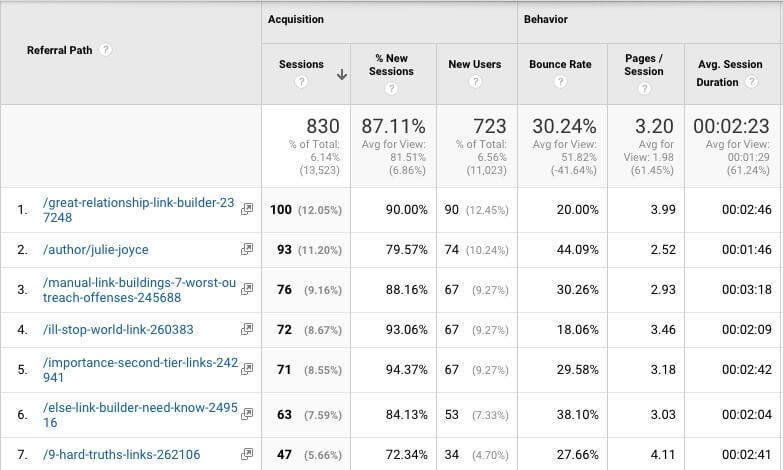17 link resolutions for 2017
Link builders, what can you do better this year? Columnist Julie Joyce shares her 17 link-building resolutions for 2017.

Back in 2014, I had 14 link resolutions. For 2017, I have 17 for you.
Maybe you’re doing some or all of the following already; congratulations if that’s true, as you’re much more proactive than most. If you aren’t doing any, start with just a couple — but please, please, please make sure you do the first one. That’s the biggest first step you can take if you’re not clued in to what’s involved with your link development.
1. Check out your backlink profile
This one is really never going to change, as far as I’m concerned. It’s definitely not earth-shatteringly new advice, but you would be utterly amazed at the number of people who have no clue about their link profile. I’ve dealt with people who don’t even know where they’d go to look for their backlinks. I’ve dealt with people who are confused about how to analyze what’s there and have never bothered, and people who are too terrified to even dig in.
Whether you want to pay for a tool or just rely on what Google shows you in their Search Console, just make sure you’re looking. Be aware that different tools show you different data, though, so if you’re going to keep track (and of course you are) then pick one and use it for trending purposes, too.
2. Look at what your competitors are doing
I don’t like the idea of mimicking anyone else’s efforts, but I know a lot of link builders who disagree with me there. What I do like to get out of competitor research is a better idea of what is NOT there. That way I have a good idea of what to do to fill a void with something useful and not just copy something else.
I love BuzzSumo for this task. Many clients ask questions like, “Why is competitor X doing so well with half the number of links that I have?” or “How is it that so-and-so just started to rank way above me and they’re brand-new?” I can’t think of any big downsides of seeing what your competitors are doing and figuring out how to use that to your advantage somehow.
3. Don’t assume that you need to churn out excessive content in order to do well
Putting out 10 pieces of content a week is not sustainable for many sites. I mean, if you’re one of those lucky brands that can make this happen, go for it. But if you’re like most brands, where this would be next to impossible to do well, accept it — don’t just vomit out watered-down, useless content. It’s hard to get links to great content sometimes. Poor content doesn’t stand much of a chance.
4. Don’t be surprised when you stop your marketing efforts and you stop doing so well
Everyone else is continuing to move forward, so when you halt your work, you’re likely going to get left behind by your competitors. We’ve had so many clients get to where they want to be in the rankings and then pause our link development work — and over half of them have come back within a couple of months.
5. Don’t discount the power of paid media
Paid media can be effectively utilized in conjunction with your link-building efforts. If you can’t rank organically for some key terms, I see nothing wrong with using paid ads to capture the traffic from those phrases.
Alternatively, if you need to watch your budget and you’re ranking number one for certain keywords that are costing you a fortune in PPC, consider slacking off on the paid stuff just a bit if you can (unless your conversions are much stronger in PPC).
6. Spend more time on research before you create content
You can write something amazing, but if it’s not the right fit for your audience, it’s not going to be as effective. About a year ago, I wrote about this exact issue, explaining how poor preparation caused me to do a really poor job on a content marketing workshop. I didn’t research my audience enough.
7. Build genuine relationships
Don’t only interact with someone in order to get a link or a mention on Twitter. If the only time you are reaching out to an “influencer” is when you want them to comment on a post of yours or upvote it somewhere, they’re going to stop caring about you. I speak from experience here.
8. Be more selective about promoting your own content.
Don’t badger people with your content. I do really love it when someone writes a piece that they feel might interest me and they let me know, because I miss a lot when I’m not focusing on what’s being published. I hate it when the same people direct message me on Twitter every single time they write an article when they write five a week.
9. Figure out how and where to promote your content
Don’t expect that you’re going to get eyes on your work without some form of promotion. Years ago, that might have been true; today, it’s not. There’s just too much to wade through, too much noise.
I want to mention BuzzSumo again here, as it’s fantastic for showing you where different content performs the best in terms of social media platforms.
10. Promote something other than only that which benefits you directly
You know those Twitter users who only tweet their own articles? And then retweet them in case you missed them the first 10 times? Don’t be like that.
I’ve made a lot of really good contacts from sharing other people’s work. It’s a great way to start building a relationship. Note the example below, where my fellow link builder Debra Mastaler is tweeting other people’s content, not her own. She’s not mentioned in these pieces either, so there’s no major benefit to her doing this. I like her style.
11. Take the time to carefully and thoroughly get an idea of your risk tolerance
I feel that this is such a big problem right now. Only you can make the decision about how much you’re willing to risk and which methods you’re okay with using. If you want to build some links, and you’re thinking of doing so in a way that violates Google’s webmaster guidelines, don’t pursue it without getting a full understanding of what’s involved.
Don’t ever let anyone tell you that a tactic which violates the guidelines “won’t be an issue,” either. It may not be, but you can’t assume anything when it comes to marketing. Don’t engage in questionable link-building methods if you aren’t prepared to deal with the potential fallout.
12. Ask questions, always
Ask your link team why they recommend a certain method. Ask about the downsides of everything. Ask about the benefits of investing in content. Ask yourself what you expect to get out of this. Ask anything that pops into your head. Use Casie Gillette’s piece as a starting point if you need help with what questions you should be asking. I certainly would if someone were building links for my site.
13. Stop chasing algorithms
Remember when we used to do all that exact match anchor text? And then we did a lot of “click here” anchors? We figured out what worked and abused it until it messed us up, and then we went with the latest and greatest trend. I’ve stopped doing that and have had much more success with link building since we started to just build links that looked like good links. It’s very simple!
14. Stop changing direction every time you read something new
I’m sure most of you have a client who emails you the second they learn about a new trend or read an article that seemingly contradicts your current link-building strategy.
Many people write controversial pieces just for attention. Some have done testing and have valid points, but maybe what they’re talking about doesn’t apply to you. Nothing is worse than a client who constantly wants you to stop what you’re doing and do something different because they read some article on another industry site. If it’s working for you and you’re happy, keep it up.
15. Remember that rankings aren’t everything
Move your focus away from simply rising up in the rankings. I have a few clients who really, really hate a nofollowed link, even when it’s on a good site and has the potential to send them relevant traffic. I would never turn that down, personally. If I get a conversion out of it, I’m good to go.
16. Replicate your best links
Analyze the links that send you the most relevant traffic, and figure out how to get more like them. These are your key links. Maybe you have a great link in an older article on a particular site, and every month you get some conversions from it. Wouldn’t it be smart to try and get another link in a newer article on that same site and see if that brings you more conversions?
To give you an example, one of my best sources for new clients is this site. I write a monthly column, and every month I get some really great contacts from it. I take it seriously and keep writing. I don’t just hope that I’ll get continued referrals from my old work.
If you write a post for another site and it goes crazy and everything’s amazing, why not ask for a column? You have nothing to lose from trying.
17. Don’t take every single opportunity to get a link
I feel bad about saying no to people who ask me to contribute to a roundup post, for example, but I don’t have the time or the desire to contribute to 10 a week. In some cases, the sites are brand-new and make me a bit nervous — and if I don’t want my link there, I’m not going to bother. Be picky. Just because you can get a link somewhere does not mean that you should get a link there.
Here’s to a great 2017!
Contributing authors are invited to create content for Search Engine Land and are chosen for their expertise and contribution to the search community. Our contributors work under the oversight of the editorial staff and contributions are checked for quality and relevance to our readers. The opinions they express are their own.
Related stories
New on Search Engine Land


